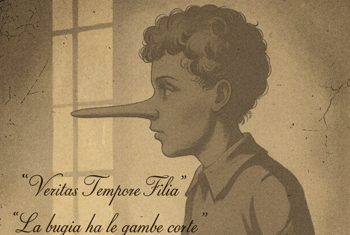As Plain as the Nose on Your Face — a Glimpse of Wonder entry™ —
 People have long said that a lie is “as plain as the nose on your face.” Maybe that’s why Carlo Collodi, back in 1883, chose a boy’s nose as the telltale marker of deceit. His wooden puppet Pinocchio couldn’t keep a secret — each falsehood stretched his face farther into a billboard of dishonesty.
People have long said that a lie is “as plain as the nose on your face.” Maybe that’s why Carlo Collodi, back in 1883, chose a boy’s nose as the telltale marker of deceit. His wooden puppet Pinocchio couldn’t keep a secret — each falsehood stretched his face farther into a billboard of dishonesty.
That was children’s fiction. Yet more than a century later, researchers at the University of Granada in Spain used thermal cameras and found that lying changes facial temperature in telltale ways. Early reports noted warming around the nose and inner eye, while later work showed the nose tip often cools by about 0.6–1.2 °C as the forehead warms by about 0.6–1.5 °C — a pattern they nicknamed the “Pinocchio effect.”
So Collodi’s fairy-tale instinct, drawn from an old proverb, now has a surprising scientific echo. Our bodies betray dishonesty in ways even we can’t see — but the truth shows up all the same.
 Why does this happen? The University of Granada team explained that lying creates stress and mental strain. The brain has to juggle the falsehood, guard against being caught, and manage the anxiety of deceit. That load alters blood flow and heat distribution in the face — typically lowering the nose tip temperature while raising the forehead — so the body leaks truth even when the tongue resists it.
Why does this happen? The University of Granada team explained that lying creates stress and mental strain. The brain has to juggle the falsehood, guard against being caught, and manage the anxiety of deceit. That load alters blood flow and heat distribution in the face — typically lowering the nose tip temperature while raising the forehead — so the body leaks truth even when the tongue resists it.
But this “Pinocchio effect” is not part of Jehovah’s original design. It’s a byproduct of imperfection. In a world without sin, there would be no lies to trigger it. By contrast, other changes in facial blood flow — like blushing — aren’t flaws at all. A sudden scare, a moment of pressure, even the awareness of being seen can cause cheeks to flush. That response may have been part of human design from the start, an honest signal of sincerity or intensity.

Think of Jesus in Gethsemane. Under crushing stress, his sympathetic system responded so strongly that “his sweat became as drops of blood falling to the ground” (Luke 22:44, NWT). If the Son of God could experience such symptoms, then blushing itself is no weakness — it’s simply part of being fully human.
How fitting, then, that Proverbs 12:19 (NWT) tells us: “Truthful lips will endure forever, but a lying tongue will last for only a moment.” The body was made to carry truth with ease, but it stumbles under falsehood. Collodi’s fairy tale, science’s thermal cameras, and Jehovah’s Word all point to the same reality: dishonesty is fleeting and unstable, but truth lasts. Live honestly, and you’ll never need to wonder if the warmth on your face is betraying you.
Edited by dljbsp
-
 1
1
-
 1
1
-
 1
1

2 Comments
Recommended Comments
Join the conversation with your brothers and sisters!
You are posting as a guest. If you are already a member, sign in now to post with your existing account.
Note: Your post will require moderator approval before it will be visible.